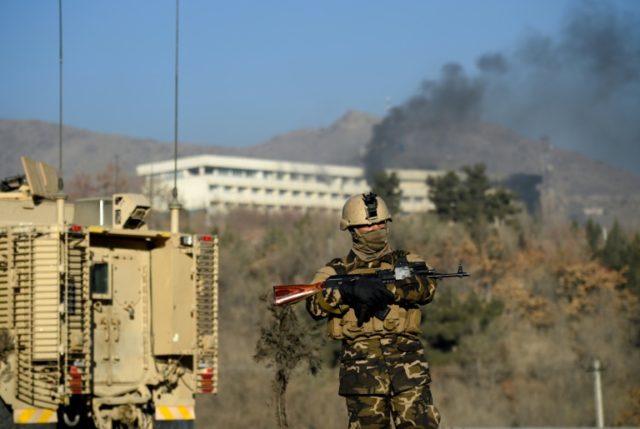WASHINGTON, DC — Islamabad has refused to take “decisive action” against Pakistan-based jihadist groups planning and carrying out attacks in neighboring Afghanistan despite U.S. President Donald Trump’s move to suspend security assistance to Pakistan.
President Trump suspended American taxpayer-funded aid to Pakistan in January after urging Islamabad to take action against terrorist groups and their sanctuaries on Pakistani soil for months. Islamabad denies that Pakistan is serving as a sanctuary for terrorist groups fighting U.S. troops and their allies in Afghanistan.
During a Senate Foreign Relations Committee hearing Tuesday on the U.S. Afghan war strategy, Randall Schriver, the assistant secretary for Asian & Pacific Security Affairs at the U.S. Department of Defense (DoD), told lawmakers, referring to Islamabad’s actions against terrorists:
Since the announcement of the South Asia Strategy in August, Pakistan has taken some positive steps. The steps to date, however, do not reflect the type of decisive action that is necessary to restore regional stability.
We continue to call on Pakistan to take decisive, sustained action against terrorist safe havens on its soil. DoD will continue to press Pakistan to make positive changes in its approach, and will provide clear and consistent feedback in response to Pakistani action or inaction. DoD wants to ensure that Pakistan has a “bridge back” to enhanced cooperation if it takes decisive action on U.S. requests.
In late January, the U.S.-backed Afghan government unveiled what it claimed to be proof that the Islamic State (ISIS/ISIL) and Taliban attackers who killed about 200 people on Afghan soil over the last month trained and planned the assaults in neighboring Pakistan.
The top Pentagon official acknowledged that Islamabad has made some sacrifices in fighting terrorist groups in the Afghanistan-Pakistan region, home to the largest concentration of U.S. -designated terrorist groups in the world.
Schriver told the Senators:
Pakistan is a long-standing and important partner, with deep historical ties to the U.S., and is key to the success of the President’s South Asia strategy. America’s interests are clear: we must stop the resurgence of safe havens that enable terrorists to threaten America, we must encourage restraint in Pakistan’s nuclear weapons program and prevent nuclear weapons and materials from falling into the hands of terrorists. We must also encourage India and Pakistan to address tensions, in order to reduce the risk of nuclear war.
He went on to say that U.S. Secretary of Defense James Mattis, during his first trip to Pakistan in December, told the Pakistani Chief of Army Staff Bajwa that America appreciates Pakistan’s “significant sacrifices” in the ongoing war in Afghanistan, which started in October 2001.
Secretary Mattis also indicated “Pakistan can play a vital role in working with the United States and others to facilitate a peace process in Afghanistan,” according to the Pentagon official, who also said the Pentagon chief “stressed that we must see a change in Pakistan’s behavior in the areas of greatest concern to the United States.”
The United States hopes Pakistan uses its influence over the Afghan Taliban to bring the jihadist group to the peace negotiating table, John Sullivan, the Deputy Secretary of State, told the Senate panel while testifying alongside the Pentagon official.
Sullivan acknowledged that the current security conditions, namely the recent attacks in Kabul, “preclude” the Afghan government from achieving some sort of reconciliation status with the Afghan Taliban, but stressed that the United States remains committed to the peace process, a major tenet of Trump’s strategy.
“We hope the Pakistanis will also help to convince the Taliban to enter a peace process,” declared Sullivan, later adding, “We have shared with Pakistan our South Asia strategy in detail and have made our expectations clear to Pakistan, emphasizing that they must take decisive action against all militant and terrorist groups based there.”
The State official told lawmakers that Trump’s strategy is beginning to improve the deteriorating security conditions in Afghanistan.
“Despite recent setbacks stemming from horrific and senseless acts of violence, the President’s South Asia strategy is showing some signs of progress,” proclaimed Sullivan. “On the battlefield, we are seeing the Taliban’s momentum begin to slow.”
However, Schriver conceded that the United States is “clearly not where we want to be,” noting that there have been “Taliban gains” in rural areas in Afghanistan.
According to the latest assessment by the U.S. Special Inspector General for Afghanistan Reconstruction (SIGAR), a watchdog agency, terrorist groups, primarily the Taliban, controlled or contested about 45 percent of Afghanistan as of October 2017, a slight increase in the territory held by the terrorists in August of the same year.
The American officials revealed that the U.S. is spending more than $45 billion annually on the war in Afghanistan where more than 2,260 U.S. troops have lost their lives and another 20,290 have been wounded.

COMMENTS
Please let us know if you're having issues with commenting.